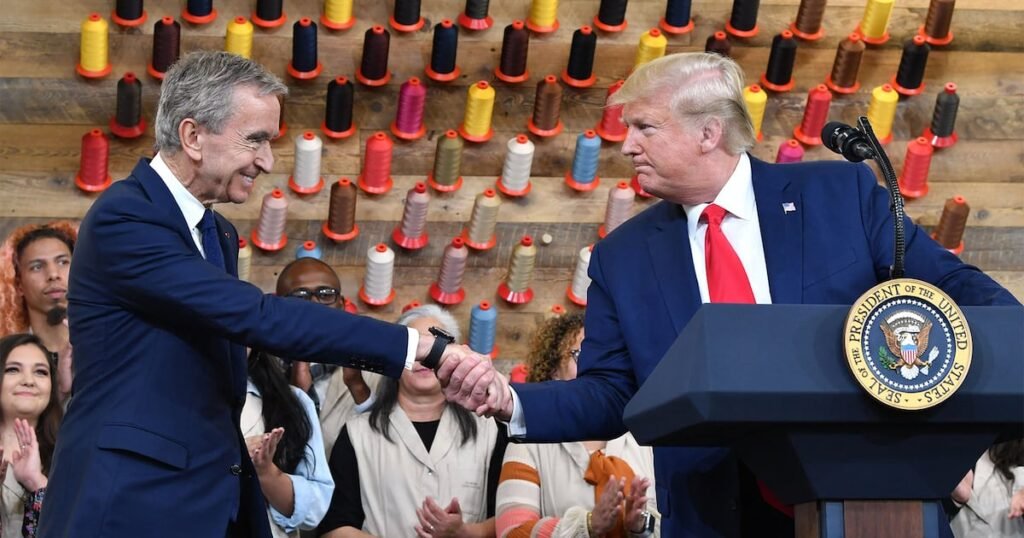
Billionaires were out in force at Donald Trump’s inauguration on Monday. Alongside the raft of US tech titans was Bernard Arnault, founder and chief executive officer of LVMH Moet Hennessy Louis Vuitton SE, accompanied by daughter Delphine and son Alexandre, both top executives at the family-controlled firm.
Arnault’s presence might have raised eyebrows. But it was good business sense for the world’s fifth-richest man.
The Arnaults and the Trumps go back some way. In 2017, Bernard Arnault was one of the first CEOs to visit the president following his election in 2016, taking Alexandre with him. Courting Trump this time around cements LVMH’s position as the leading luxury goods company in America and could protect against tariffs. It might just reenergise fashion too.
With Chinese luxury spending in the doldrums, the US is the best hope for upmarket sellers this year. This has already been the case for Cartier-owner Cie Financiere Richemont SA, which saw sales in the Americas rise 22 percent in its third quarter. LVMH, which reports fourth-quarter results next week, might well follow.
US luxury sales are typically correlated with stock markets, and with the S&P 500 close to record highs and Bitcoin continuing its upward ascent, there’s a good chance that Americans will keep spending on fancy bags and watches. If they do, LVMH stands to benefit the most. It generated 25 percent of sales from the US in the first nine months of 2024, including the contribution from American icon Tiffany & Co.
The other important reason for Arnault to be on good terms with Trump is tariffs.
Although luxury companies’ exposure to Chinese manufacturing is limited, they would be caught by any levies on European products. Ordinarily, they would be able to pass on price increases to their wealthy customers, but they have less scope for hikes after rampant inflation.
In the event of tariffs, LVMH would be in a strong position. After France and Italy, the US is its biggest production centre. Louis Vuitton, its largest brand, already makes handbags and small leather goods at plants in Texas and California. Tiffany designs and manufactures in the US, while LVMH owns vineyards in the Napa Valley.
In 2019, two years after his first visit to the president, Arnault followed through on a pledge to create more US jobs, with the opening of the Texas plant. It’s not hard to see LVMH doing something similar this time around. Not only would it bring favour with the commander-in-chief, but for some goods, such as coin purses and cardholders, “Made in America” might be a useful marketing tool.
The luxury industry may also benefit from Trump’s trickle-down effect on the cultural zeitgeist.
It’s notable that he rarely does casual — just look at his sharp-shouldered suits. Melania’s glamourous outfits are bound to grab attention, while Second Lady Usha Vance became a new style icon after she wore a pink Oscar de la Renta scarf coat on Monday.
If Washington smartens up, the shift could inject life into formal wear more broadly — helping retailers battle Lululemon Athletica Inc.’s ABC Pant. The footwear industry could certainly do with a lift from Melania’s towering heels: The stiletto is one category that is yet to bounce back from the pandemic.
Dior, LVMH’s second biggest brand, of which Delphine Arnault is CEO, dressed Melania on Sunday, while Ivanka Trump wore the designer as well as a gown by sister fashion house Givenchy.
Trump’s embrace of money and power could encourage consumers to more openly flaunt their wealth, which would be good for sales of handbags and watches, the traditional signifiers of status. Billionaires are already changing their priorities; they might alter their sartorial choices too. Witness the rare $900,000 Swiss watch that Mark Zuckerberg wore in a Meta Platforms Inc. video announcing the end of fact-checking.
If the age of excess were to make a comeback, it would be a welcome relief for Big Luxury. Logos taking a backseat for the past couple of years has meant brands have had to convince customers to spend without one of their most valuable assets — their instantly recognisable marques. It has been easier for minimalist niche brands, such as The Row and Khaite, to gain cultural relevance and sales, and it’s encouraged the rise of dupe culture, according to analysts at Bank of America Corp.
The Arnaults cozying up to the Trumps isn’t without peril. Some customers might be upset and vote with their wallets. And Arnault’s appearance at the inauguration coincided with Chaumet, the group’s division which designed the Olympic medals, facing criticism over the bronze awards tarnishing. (LVMH says it wasn’t involved in the production of the medals.)
But with so much riding on US top-end spending, this is a risk worth taking for the other King of Bling.
By Andrea Felsted

